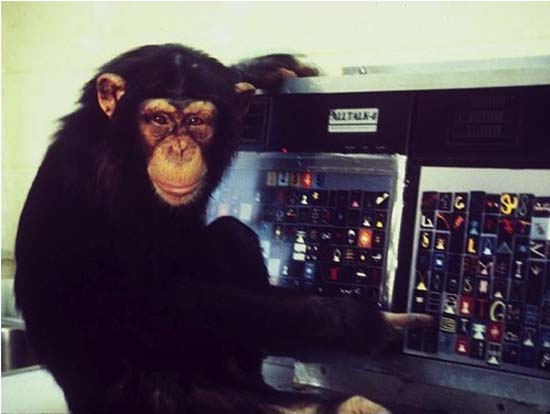

The chimps grab a joystick and a spot in front of a TV monitor.
They start with Level 1, where they toggle the joystick in the direction of a purple object. Most are successful and rewarded with food. In fact, the chimps use lexigrams to point out what food they want before testing begins.
Level 2 requires the chimps to toggle their joystick until they again find the purple object, but this time, it’s hidden behind a brick wall.
The virtual reality simulation, however, isn’t only fun and games. It helps Dr. Francine Dolins analyze the chimpanzees’ spatial cognitive abilities.
Dolins, University of Michigan-Dearborn assistant professor of psychology, spent her spring break at Georgia State University’s Language Research Center, where she tested four chimpanzees’ navigational behavior through virtual reality maze environments.
“They seem to understand the movement with their hand and the cursor moving on the screen,” she said. “Our results found that chimps learned to discriminate between landmarks to successfully localize goal sites.”
But the simulation trials wouldn’t have been as successful without a functional joystick. That’s where a group of UM-Ann Arbor engineering students, enrolled in the multidisciplinary design course, come into play.
Students there helped design a joystick fit for a chimp. And their work seems to have paid off.
“The old joysticks weren’t designed for a chimpanzees’ grip,” Dolins said. “The handles weren’t very good. This one seems to have more precision and it gives them a better grip. The chimps were able to go slow and control the speed better.”
That success resonated with UM-Ann Arbor junior Andy Scheffer, who accompanied Dolins to Decatur.
Scheffer was attracted to Dolins’ research because it blended psychology and engineering. He is a psychology major, and plans to minor in multidisciplinary design.
Scheffer initially didn’t share Dolins’ affinity for primates, but after taking a course about animal behavior, he grew to appreciate chimpanzees.
The course, however, couldn’t prepare Scheffer for the first time he witnessed chimps handling the joysticks.
“When I first saw that, it was a bit breathtaking and shocking,” he said. “It’s almost like a parent-child relationship. When they get stuck on something, it’s hard for you to just stand there. You’re really rooting for them.”
Scheffer returned to campus last week and, along with his classmates, plans to tweak the prototype joystick.
Meanwhile, Dolins plans to return to the Language Research Center next month to continue her research with the chimps.
“The use of virtual reality provides fascinating avenues for further research on how apes perceive their world and how they interpret perceptual details to solve navigational problems,” she said.





